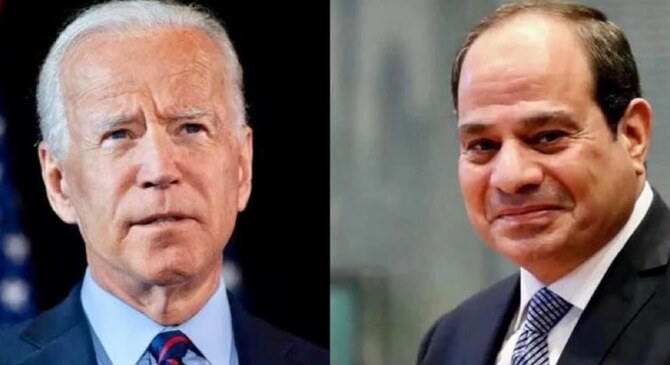CAIRO: US President Joe Biden and Egyptian President Abdel Fattah El-Sisi discussed negotiations for a ceasefire and hostage release deal in Gaza on Tuesday and agreed to remain in close coordination in the coming hours, the White House said.
Negotiators were trying on Tuesday to clinch agreement on the final details of a ceasefire in Gaza after marathon talks in Qatar, with the involved parties saying a deal was closer than ever. Both Egypt and the US are mediators in the talks.
Democrat Biden, whose administration has been taking part alongside an envoy of Republican President-elect Donald Trump, has said a deal was close.
“Both leaders committed to remain in close coordination directly and through their teams over the coming hours,” the White House said in a statement after the call between Biden and El-Sisi.
“Both leaders emphasized the urgent need for a deal to be implemented,” the White House added.
Ceasefire talks have previously faced hurdles.
The White House said the two leaders also discussed surging humanitarian aid in Gaza where Israel’s military assault in the last 15 months has killed over 46,000 Palestinians, according to the local health ministry, while also triggering accusations of genocide and war crimes that Israel denies.
The assault has also displaced nearly Gaza’s entire 2.3 million population and caused a hunger crisis.
The latest bloodshed in the decades-old Israeli-Palestinian conflict was triggered on Oct. 7, 2023 , when Palestinian Hamas militants attacked Israel, killing 1,200 and taking about 250 hostages, according to Israeli allies.
Egypt’s El-Sisi, Biden discuss Gaza ceasefire, hostages-for-prisoners swap deal, Egypt presidency says
https://arab.news/697hq
Egypt’s El-Sisi, Biden discuss Gaza ceasefire, hostages-for-prisoners swap deal, Egypt presidency says

- They also discussed a hostages-for-prisoners exchange deal
Palestinian man dies after being shot by Israeli forces

- Baraa Bilal Issa Qablan, 21, was traveling in vehicle near city of Qalqilya
LONDON: A Palestinian man died on Monday after being shot by Israeli forces during an incident on Sunday close to the occupied West Bank city of Qalqilya.
Baraa Bilal Issa Qablan, 21, was injured when Israeli forces at the northern entrance to the town of Azzun opened fire on a vehicle traveling along the Qalqilya-Nablus road.
Momen Nidal Abu Riyash, 19, a resident of Qalqilya, was killed in the incident and a third man, identified as Muhammad Saeed Taha Hussein, was taken into custody.
Qablan was injured and detained by Israeli forces, the Wafa news agency reported. The Palestinian Authority’s General Authority for Civil Affairs said on Monday that he later succumbed to his injuries.
More than 1,000 Palestinians, including militants, have been killed in the West Bank by Israeli forces or settlers since the start of the Gaza war in late 2023, according to the Palestinian Health Ministry.
During the same period, 43 Israelis, including soldiers, have been killed in Palestinian attacks in the West Bank, according to official Israeli figures.














